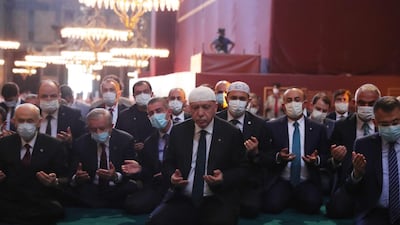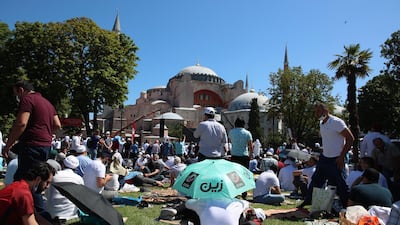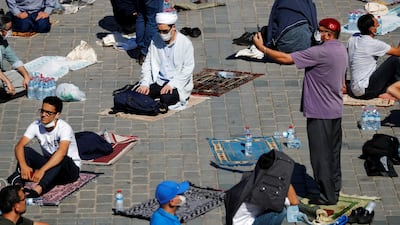Greece hit out on Friday at Turkey's decision to convert Hagia Sophia back into a mosque, saying it was a demonstration of "weakness", as churches around the country mourned the controversial move.
"What is happening in (Istanbul) this day is not a show of force, but proof of weakness," Greek prime minister Kyriakos Mitsotakis said in a statement.
Nevertheless, the move would not "diminish the radiance of a global heritage monument", he said.
"Especially to us Orthodox Christians, Hagia Sophia today is in our hearts more than ever. It is where our heart beats," Mr Mitsotakis said.
On Friday, Turkish President Recep Tayyip Erdogan joined thousands in the first Muslim prayers in Hagia Sophia since the Istanbul landmark was reconverted from a museum into a mosque.
The Unesco World Heritage site was originally the Byzantine Empire's main cathedral before its first conversion into a mosque after the Ottoman conquest of Constantinople in 1453.
In 1934, modern Turkey's founder Mustafa Kemal Ataturk ordered it be turned into a museum, but a Turkish court said earlier this month it had been registered in property deeds as a mosque, paving the way for the Muslim worship to be reintroduced on Friday.
At midday, churches around Greece rang their bells and flew their flags at half-mast in protest against what the head of the Church of Greece, Archbishop Ieronymos, called an "unholy act of defiling" the former cathedral.
"(Today) is a day of mourning for all of... Christianity," Ieronymos said.
However, Constantinos Bogdanos, a deputy from the ruling New Democracy party, told AFP: "It is not a day of mourning, it is a day of revelation of Turkey's growing aggressiveness."
Religious and nationalist groups also staged protests in Athens and Thessaloniki.
Later on Friday, the archbishop held a special service at the Athens Metropolis, during which he chanted the Akathist Hymn in honour of the Virgin Mary.
According to Greek tradition, the same service was held in Hagia Sophia on the eve of the Byzantine Empire capital's fall to the Ottomans.
Hagia Sophia is "a symbol of our faith and a universal monument of culture," Ieronymos said.
On July 10, Turkey's highest administrative court, the Council of State, cancelled the 1934 decision to turn Hagia Sophia into a museum, saying it was registered as a mosque.
Erdogan then ordered the sixth-century monument be reopened for Muslim worship, deeply angering the Christian community and further straining relations with NATO ally Greece.
Erdogan pursued the plan despite appeals from the United States and Russia and condemnation by Pope Francis.
UK’s AI plan
- AI ambassadors such as MIT economist Simon Johnson, Monzo cofounder Tom Blomfield and Google DeepMind’s Raia Hadsell
- £10bn AI growth zone in South Wales to create 5,000 jobs
- £100m of government support for startups building AI hardware products
- £250m to train new AI models
Our legal consultant
Name: Dr Hassan Mohsen Elhais
Position: legal consultant with Al Rowaad Advocates and Legal Consultants.
Hili 2: Unesco World Heritage site
The site is part of the Hili archaeological park in Al Ain. Excavations there have proved the existence of the earliest known agricultural communities in modern-day UAE. Some date to the Bronze Age but Hili 2 is an Iron Age site. The Iron Age witnessed the development of the falaj, a network of channels that funnelled water from natural springs in the area. Wells allowed settlements to be established, but falaj meant they could grow and thrive. Unesco, the UN's cultural body, awarded Al Ain's sites - including Hili 2 - world heritage status in 2011. Now the most recent dig at the site has revealed even more about the skilled people that lived and worked there.
Sholto Byrnes on Myanmar politics
The specs
Engine: 2.0-litre 4-cyl, 48V hybrid
Transmission: eight-speed automatic
Power: 325bhp
Torque: 450Nm
Price: Dh289,000
2025 Fifa Club World Cup groups
Group A: Palmeiras, Porto, Al Ahly, Inter Miami.
Group B: Paris Saint-Germain, Atletico Madrid, Botafogo, Seattle.
Group C: Bayern Munich, Auckland City, Boca Juniors, Benfica.
Group D: Flamengo, ES Tunis, Chelsea, Leon.
Group E: River Plate, Urawa, Monterrey, Inter Milan.
Group F: Fluminense, Borussia Dortmund, Ulsan, Mamelodi Sundowns.
Group G: Manchester City, Wydad, Al Ain, Juventus.
Group H: Real Madrid, Al Hilal, Pachuca, Salzburg.
The%20Specs%20
%3Cp%3E%3Cstrong%3ELamborghini%20LM002%3C%2Fstrong%3E%3Cbr%3E%3Cstrong%3EEngine%3A%3C%2Fstrong%3E%205.2-litre%20V12%3Cbr%3E%3Cstrong%3EPower%3A%3C%2Fstrong%3E%20450hp%20at%206%2C800rpm%3Cbr%3E%3Cstrong%3ETorque%3A%20%3C%2Fstrong%3E500Nm%20at%204%2C500rpm%3Cbr%3E%3Cstrong%3ETransmission%3A%20%3C%2Fstrong%3EFive-speed%20manual%3Cbr%3E%3Cstrong%3E0-100kph%3A%3C%2Fstrong%3E%209%20seconds%20(approx)%3Cbr%3E%3Cstrong%3ETop%20speed%3A%3C%2Fstrong%3E%20210kph%20(approx)%3Cbr%3E%3Cstrong%3EYears%20built%3A%3C%2Fstrong%3E%201986-93%3Cbr%3E%3Cstrong%3ETotal%20vehicles%20built%3A%3C%2Fstrong%3E%20328%3Cbr%3E%3Cstrong%3EValue%20today%3A%3C%2Fstrong%3E%20%24300%2C000%2B%3Cbr%3E%3C%2Fp%3E%0A
2021 World Triathlon Championship Series
May 15: Yokohama, Japan
June 5: Leeds, UK
June 24: Montreal, Canada
July 10: Hamburg, Germany
Aug 17-22: Edmonton, Canada (World Triathlon Championship Final)
Nov 5-6 : Abu Dhabi, UAE
Date TBC: Chengdu, China
The specs: 2017 Dodge Viper SRT
Price, base / as tested Dh460,000
Engine 8.4L V10
Transmission Six-speed manual
Power 645hp @ 6,200rpm
Torque 813Nm @ 5,000rpm
Fuel economy, combined 16.8L / 100km
Star%20Wars%3A%20Episode%20I%20%E2%80%93%20The%20Phantom%20Menace
%3Cp%3E%3Cstrong%3EDeveloper%3A%3C%2Fstrong%3E%20Big%20Ape%20Productions%3Cbr%3E%3Cstrong%3EPublisher%3A%3C%2Fstrong%3E%20LucasArts%3Cbr%3E%3Cstrong%3EConsoles%3A%3C%2Fstrong%3E%20PC%2C%20PlayStation%3Cbr%3E%3Cstrong%3ERating%3A%3C%2Fstrong%3E%202%2F5%3C%2Fp%3E%0A
The five types of long-term residential visas
Obed Suhail of ServiceMarket, an online home services marketplace, outlines the five types of long-term residential visas:
Investors:
A 10-year residency visa can be obtained by investors who invest Dh10 million, out of which 60 per cent should not be in real estate. It can be a public investment through a deposit or in a business. Those who invest Dh5 million or more in property are eligible for a five-year residency visa. The invested amount should be completely owned by the investors, not loaned, and retained for at least three years.
Entrepreneurs:
A five-year multiple entry visa is available to entrepreneurs with a previous project worth Dh0.5m or those with the approval of an accredited business incubator in the UAE.
Specialists
Expats with specialised talents, including doctors, specialists, scientists, inventors, and creative individuals working in the field of culture and art are eligible for a 10-year visa, given that they have a valid employment contract in one of these fields in the country.
Outstanding students:
A five-year visa will be granted to outstanding students who have a grade of 95 per cent or higher in a secondary school, or those who graduate with a GPA of 3.75 from a university.
Retirees:
Expats who are at least 55 years old can obtain a five-year retirement visa if they invest Dh2m in property, have savings of Dh1m or more, or have a monthly income of at least Dh20,000.
Key facilities
- Olympic-size swimming pool with a split bulkhead for multi-use configurations, including water polo and 50m/25m training lanes
- Premier League-standard football pitch
- 400m Olympic running track
- NBA-spec basketball court with auditorium
- 600-seat auditorium
- Spaces for historical and cultural exploration
- An elevated football field that doubles as a helipad
- Specialist robotics and science laboratories
- AR and VR-enabled learning centres
- Disruption Lab and Research Centre for developing entrepreneurial skills
Tax authority targets shisha levy evasion
The Federal Tax Authority will track shisha imports with electronic markers to protect customers and ensure levies have been paid.
Khalid Ali Al Bustani, director of the tax authority, on Sunday said the move is to "prevent tax evasion and support the authority’s tax collection efforts".
The scheme’s first phase, which came into effect on 1st January, 2019, covers all types of imported and domestically produced and distributed cigarettes. As of May 1, importing any type of cigarettes without the digital marks will be prohibited.
He said the latest phase will see imported and locally produced shisha tobacco tracked by the final quarter of this year.
"The FTA also maintains ongoing communication with concerned companies, to help them adapt their systems to meet our requirements and coordinate between all parties involved," he said.
As with cigarettes, shisha was hit with a 100 per cent tax in October 2017, though manufacturers and cafes absorbed some of the costs to prevent prices doubling.
'C'mon C'mon'
Director:Mike Mills
Stars:Joaquin Phoenix, Gaby Hoffmann, Woody Norman
Rating: 4/5
New UK refugee system
- A new “core protection” for refugees moving from permanent to a more basic, temporary protection
- Shortened leave to remain - refugees will receive 30 months instead of five years
- A longer path to settlement with no indefinite settled status until a refugee has spent 20 years in Britain
- To encourage refugees to integrate the government will encourage them to out of the core protection route wherever possible.
- Under core protection there will be no automatic right to family reunion
- Refugees will have a reduced right to public funds
Who's who in Yemen conflict
Houthis: Iran-backed rebels who occupy Sanaa and run unrecognised government
Yemeni government: Exiled government in Aden led by eight-member Presidential Leadership Council
Southern Transitional Council: Faction in Yemeni government that seeks autonomy for the south
Habrish 'rebels': Tribal-backed forces feuding with STC over control of oil in government territory
NATIONAL%20SELECTIONS
%3Cp%3E6pm%3A%20Falling%20Shadow%3Cbr%3E6.35pm%3A%20Quality%20Boone%3Cbr%3E7.10pm%3A%20Al%20Dasim%3Cbr%3E7.45pm%3A%20Withering%3Cbr%3E8.20pm%3A%20Lazuli%3Cbr%3E8.55pm%3A%20Tiger%20Nation%3Cbr%3E9.30pm%3A%20Modern%20News%3C%2Fp%3E%0A
The specs
Engine: 3.5-litre twin-turbo V6
Power: 380hp at 5,800rpm
Torque: 530Nm at 1,300-4,500rpm
Transmission: Eight-speed auto
Price: From Dh299,000 ($81,415)
On sale: Now
UAE currency: the story behind the money in your pockets
Smart words at Make Smart Cool
Make Smart Cool is not your usual festival. Dubbed “edutainment” by organisers Najahi Events, Make Smart Cool aims to inspire its youthful target audience through a mix of interactive presentation by social media influencers and a concert finale featuring Example with DJ Wire. Here are some of the speakers sharing their inspiration and experiences on the night.
Prince Ea
With his social media videos accumulating more half a billion views, the American motivational speaker is hot on the college circuit in the US, with talks that focus on the many ways to generate passion and motivation when it comes to learning.
Khalid Al Ameri
The Emirati columnist and presenter is much loved by local youth, with writings and presentations about education, entrepreneurship and family balance. His lectures on career and personal development are sought after by the education and business sector.
Ben Ouattara
Born to an Ivorian father and German mother, the Dubai-based fitness instructor and motivational speaker is all about conquering fears and insecurities. His talk focuses on the need to gain emotional and physical fitness when facing life’s challenges. As well managing his film production company, Ouattara is one of the official ambassadors of Dubai Expo2020.
INVESTMENT PLEDGES
Cartlow: $13.4m
Rabbitmart: $14m
Smileneo: $5.8m
Soum: $4m
imVentures: $100m
Plug and Play: $25m
SPEC%20SHEET%3A%20APPLE%20IPHONE%2014
%3Cp%3E%3Cstrong%3EDisplay%3A%3C%2Fstrong%3E%C2%A06.1%22%20Super%20Retina%20XDR%20OLED%2C%202532%20x%201170%2C%20460ppi%2C%20HDR%2C%20True%20Tone%2C%20P3%2C%201200%20nits%3C%2Fp%3E%0A%3Cp%3E%3Cstrong%3EProcessor%3A%3C%2Fstrong%3E%C2%A0A15%20Bionic%2C%206-core%20CPU%2C%205-core%20GPU%2C%2016-core%20Neural%20Engine%C2%A0%3C%2Fp%3E%0A%3Cp%3E%3Cstrong%3EMemory%3A%3C%2Fstrong%3E%C2%A06GB%3C%2Fp%3E%0A%3Cp%3E%3Cstrong%3ECapacity%3A%3C%2Fstrong%3E%C2%A0128%2F256%2F512GB%3C%2Fp%3E%0A%3Cp%3E%3Cstrong%3EPlatform%3A%3C%2Fstrong%3E%C2%A0iOS%2016%3C%2Fp%3E%0A%3Cp%3E%3Cstrong%3EMain%20camera%3A%3C%2Fstrong%3E%C2%A0Dual%2012MP%20main%20(f%2F1.5)%20%2B%2012MP%20ultra-wide%20(f%2F2.4)%3B%202x%20optical%2C%205x%20digital%3B%20Photonic%20Engine%2C%20Deep%20Fusion%2C%20Smart%20HDR%204%2C%20Portrait%20Lighting%3C%2Fp%3E%0A%3Cp%3E%3Cstrong%3EMain%20camera%20video%3A%3C%2Fstrong%3E%C2%A04K%20%40%2024%2F25%2F3060fps%2C%20full-HD%20%40%2025%2F30%2F60fps%2C%20HD%20%40%2030fps%3B%20HD%20slo-mo%20%40%20120%2F240fps%3B%20night%2C%20time%20lapse%2C%20cinematic%2C%20action%20modes%3B%20Dolby%20Vision%2C%204K%20HDR%3C%2Fp%3E%0A%3Cp%3E%3Cstrong%3EFront%20camera%3A%3C%2Fstrong%3E%C2%A012MP%20TrueDepth%20(f%2F1.9)%2C%20Photonic%20Engine%2C%20Deep%20Fusion%2C%20Smart%20HDR%204%3B%20Animoji%2C%20Memoji%3B%20Portrait%20Lighting%3C%2Fp%3E%0A%3Cp%3E%3Cstrong%3EFront%20camera%20video%3A%3C%2Fstrong%3E%204K%20%40%2024%2F25%2F3060fps%2C%20full-HD%20%40%2025%2F30%2F60fps%2C%20HD%20slo-mo%20%40%20120fps%3B%20night%2C%20time%20lapse%2C%20cinematic%2C%20action%20modes%3B%20Dolby%20Vision%2C%204K%20HDR%3C%2Fp%3E%0A%3Cp%3E%3Cstrong%3EBattery%3A%3C%2Fstrong%3E%C2%A03279%20mAh%2C%C2%A0up%20to%2020h%20video%2C%2016h%20streaming%20video%2C%2080h%20audio%3B%20fast%20charge%20to%2050%25%20in%2030m%3B%20MagSafe%2C%20Qi%20wireless%20charging%3C%2Fp%3E%0A%3Cp%3E%3Cstrong%3EConnectivity%3A%3C%2Fstrong%3E%C2%A0Wi-Fi%2C%20Bluetooth%205.3%2C%20NFC%20(Apple%20Pay)%3C%2Fp%3E%0A%3Cp%3E%3Cstrong%3EBiometrics%3A%3C%2Fstrong%3E%20Face%20ID%3C%2Fp%3E%0A%3Cp%3E%3Cstrong%3EI%2FO%3A%3C%2Fstrong%3E%C2%A0Lightning%3C%2Fp%3E%0A%3Cp%3E%3Cstrong%3ECards%3A%3C%2Fstrong%3E%C2%A0Dual%20eSIM%20%2F%20eSIM%20%2B%20SIM%20(US%20models%20use%20eSIMs%20only)%3C%2Fp%3E%0A%3Cp%3E%3Cstrong%3EColours%3A%3C%2Fstrong%3E%C2%A0Blue%2C%20midnight%2C%20purple%2C%20starlight%2C%20Product%20Red%3C%2Fp%3E%0A%3Cp%3E%3Cstrong%3EIn%20the%20box%3A%3C%2Fstrong%3E%C2%A0iPhone%2014%2C%20USB-C-to-Lightning%20cable%2C%20one%20Apple%20sticker%3C%2Fp%3E%0A%3Cp%3E%3Cstrong%3EPrice%3A%3C%2Fstrong%3E%C2%A0Dh3%2C399%20%2F%20Dh3%2C799%20%2F%20Dh4%2C649%3C%2Fp%3E%0A
Paatal Lok season two
Directors: Avinash Arun, Prosit Roy
Stars: Jaideep Ahlawat, Ishwak Singh, Lc Sekhose, Merenla Imsong
Rating: 4.5/5
<html><head><meta http-equiv="Content-Type" content="text/html" charset="UTF-8" /></head><body><!--PSTYLE=* Labels%3aFH Label 18 Sport--><p>Beach soccer</p><!--PSTYLE=BY Byline--><p>Amith Passela</p><p /></body></html>
UAE currency: the story behind the money in your pockets
Benefits of first-time home buyers' scheme
- Priority access to new homes from participating developers
- Discounts on sales price of off-plan units
- Flexible payment plans from developers
- Mortgages with better interest rates, faster approval times and reduced fees
- DLD registration fee can be paid through banks or credit cards at zero interest rates
Abramovich London
A Kensington Palace Gardens house with 15 bedrooms is valued at more than £150 million.
A three-storey penthouse at Chelsea Waterfront bought for £22 million.
Steel company Evraz drops more than 10 per cent in trading after UK officials said it was potentially supplying the Russian military.
Sale of Chelsea Football Club is now impossible.
















